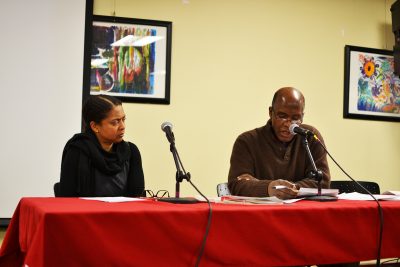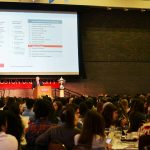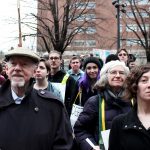
The Boston University Howard Thurman Center for Common Ground held a panel discussion with the Department of Musicology and Ethnomusicology about Haitian artists and how their work engages politics, activism and social change on Friday in the Howard Thurman Center.
The HTC, BU Students of Caribbean Ancestry and 102 South Entertainment sponsored the panel featuring a Haitian poet and a rap artist with live music and sound by DJ Loomy.
Boston Poet Laureate and Lesley University professor Danielle Georges opened the panel with a presentation focusing on how the 2010 Haiti earthquake impacted the Haitian people, using linguistic identifications to show the earthquake from a Haitian view.
“Haitians came to refer to the earthquake as ‘gudugudu,’ replicating its sound using the poetic device of onomatopoeia,” Georges said.
Georges also touched on the idea of “disaster porn,” usually seen in footage of disaster zones and tragedies and how it became the image of Haiti after the earthquake.
WMBR’s “Haiti Focus” co-host Jean Rene carried the conversation to the different ways musicians in Haiti’s carnival season, celebrations in the weeks prior to Mardi Gras, contribute to political conversations. He talked about the musicians’ radicalizing discourse and how it criticizes the government.
“Even within the context of the radicalization of the discourse, the radicalization itself is within the context of the [Haitian] dominant ideology,” Rene said. “This is not the system that is attacked itself, it would seem to be the government that is the target.”
He finished his part by posing two questions to musical artists: “Can art give a way to revolutionize social formation? Can art be a vehicle itself for social evaluation?”
Boston-based Haitian musician Vladimir Mead, also known as MasterBrain, talked about his song “Mesi Blan,” a discourse on the people of his home.
“Some people take it as I’m talking bad about the white man, but it’s not. It’s me talking to my brothers,” Mead said. “What I’m saying in the song is that some white people don’t like black people and some black people don’t like white people. But if you guys are acting the same, since the white is the most powerful one, you guys become the white guys.”
After the panel, Mead said he found the other panelists insightful.
“It’s very important to have these discussions because it will teach somebody … It will teach you and you will go out and teach someone else,” he said. “It reminds people where they come from. If there were some Haitians here who forgot for one minute who they are, it reminds them. It changes people’s minds, it helps people get better.”
Mead said he was happy to participate and share his knowledge.
“I want people to know that [Haitians] are very brave and powerful and brilliant,” he said. “I want people to know they are no color. They are just human, and they can do anything if they just believe.”
Mead added that it’s important to showcase the plurality within Haitian culture.
“I think we need to do a better job of seeing it from [the Haitian] perspective, not ours [as Americans],” Mead said.
Several students in attendance said they found the panel informative.
Adia Turner, a sophomore in the College of Arts and Sciences, said she thought the talk was educational.
“I think it’s important to get educated on global issues,” Turner said. “The panelists were great. They were incredibly educated and knowledgeable about what they talked about. I also thought it was really great that they were all Haitian, and that they were diverse in what they did.”
Skyler Vernon, a freshman in CAS, said she was drawn to the discussion because of her Dominican background.
“I wanted to hear more about how social change could be advocated through art and different perspectives on that subject,” she said. “I really enjoyed the diversity among the panel, too. It was cool to see a woman, and we also had a younger voice as well, so we got a good mix of people and perspectives.”
Ian Coss, a third-year ethnomusicology Ph.D student, said he found the commonalities between the panelists fascinating.
“It was interesting to me how one moment they would be talking about different subjects and the next they would totally connect,” Coss said. “I was especially interested in the connection between Danielle Georges and MasterBrain. They’re both poets. They’re both working with language and words but different generations [with] very different styles and approaches, so it was cool to hear them both talk about their work that has so much in common but is also so different.”














